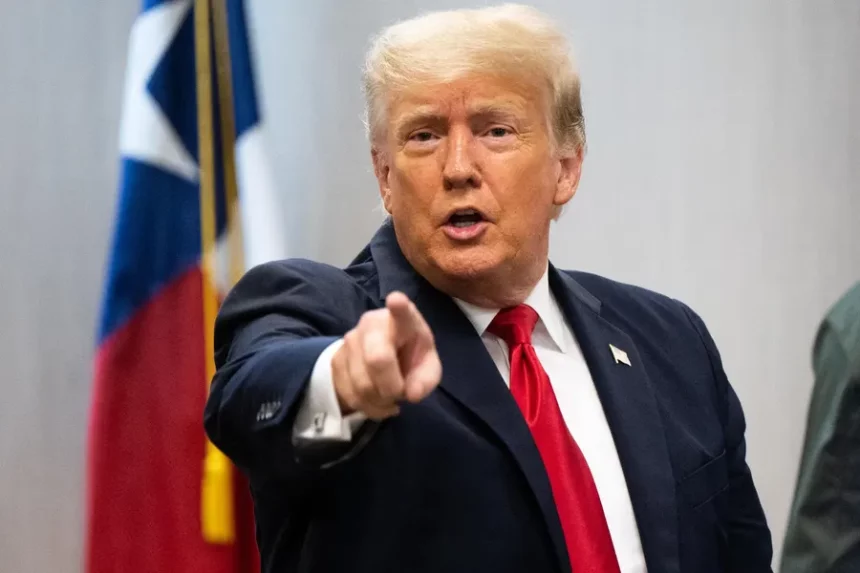As President Donald Trump escalates his trade war with China by enacting broad tariffs on Chinese imports and limiting exports of rare earth elements, the world economy is once again changing. While much of the focus has been on the U.S. and China, the repercussions are being felt globally, especially in Africa. Because these tariffs jeopardise important trade connections, energy markets, and overall economic stability, Nigeria, the largest economy in Africa, finds itself at the intersection of economic potential and disaster.
Global supply chains are being further strained as a result of Beijing’s retaliatory levies on U.S. energy and agricultural exports in response to Trump’s most recent action, which imposed a 10% tax on all Chinese imports. Given Nigeria’s reliance on oil exports, Chinese infrastructure projects, and international trade partnerships, the ramifications for Africa are significant.
“We are already seeing a decline in investor confidence,” says Adewale Ojo, an economist at the Nigerian Institute of International Affairs. “The U.S.-China trade war is no longer just about them—it’s a global economic reshuffling, and Nigeria must brace for impact.”
Nigeria’s Silent Vulnerability
China is Nigeria’s largest trading partner, with bilateral trade exceeding $23 billion in 2023. Nigeria depends on China for critical infrastructure projects, manufacturing imports, and oil sales. However, with the U.S. tightening trade restrictions, China may redirect its economic focus, affecting its investments in Africa.
OkayNg reported earlier on China’s restriction on rare earth exports, a move that could disrupt global supply chains for renewable energy and technology, industries in which Nigeria has growing stakes.
Furthermore, the U.S. Postal Service’s suspension of parcel shipments from China is positioned to disrupt e-commerce operations in Nigeria, where online retail giants like Jumia and Konga rely on Chinese imports for affordable consumer goods.
“If Chinese manufacturers struggle to access U.S. markets, they may reduce output, increasing the cost of goods globally,” warns Ojo. “That means higher prices for Nigerian businesses and consumers.”
Oil Prices and the Energy Crisis: Nigeria’s Achilles’ Heel
Trump’s tariffs have also triggered an oil market upheaval. Brent crude fell below $80 per barrel, a worrying sign for Nigeria, which depends on oil for over 85% of its government revenue.
“Lower oil prices could be catastrophic,” says Kamau Thugge, Governor of the Central Bank of Kenya, in a related report. “It may stabilise global inflation, but for oil-dependent economies like Nigeria, it’s a fiscal disaster.”
Additionally, Trump’s trade tariffs on Canadian and Mexican oil imports have led to supply chain fears, potentially tightening global crude markets. This could offer short-term relief for Nigerian oil producers, but the long-term picture remains bleak if global demand continues to decline.
Trade Tariffs and Aid Cuts
Beyond trade and oil, Trump’s policies are also impacting humanitarian aid. U.S. has frozen aid to South Africa, citing land reform policies. While Nigeria has not been directly affected by this decision, it signals a broader shift in U.S. foreign aid priorities under Trump’s administration.
Meanwhile, the U.S. had paused HIV treatment funding under PEPFAR, affecting millions of people worldwide, including 566,000 Nigerian children. Though an emergency waiver has been granted, the uncertainty surrounding U.S. aid policy raises concerns about continued support for healthcare initiatives in Nigeria.
“Aid suspensions send the wrong signal at the wrong time,” says Toyin Aderibigbe, spokesperson for Nigeria’s National Agency for the Control of AIDS. “We need long-term sustainability plans, not reactive policies.”
What’s Next?
For Nigeria to be ahead of the curve and brace for the possible impact, it must reduce its overdependence on China and explore partnerships with other emerging economies like India, Brazil, and Southeast Asia. Expanding intra-African trade under the African Continental Free Trade Agreement (AfCFTA) can also mitigate external shocks.
The government should incentivise local industries to produce essential goods that are typically imported from China. This includes textiles, electronics, and agricultural equipment. With oil revenues under threat, Nigeria must expand its tax base and implement prudent fiscal policies to cushion budget deficits.
Investing in renewable energy and refining capacity will reduce Nigeria’s vulnerability to global oil price fluctuations. Nigeria must engage diplomatically with the U.S. to ensure that trade policies consider Africa’s economic realities. A strong Nigeria-U.S. trade agreement could provide more stable market access.
Nigeria and Trump’s Trade Tariffs
Nigeria is directly in the line of the global economic maelstrom that is the U.S.-China trade war, which has evolved from a geopolitical conflict. The biggest economy in Africa faces both opportunities and challenges as a result of Trump’s trade tariffs, the instability of the oil market, and changing U.S. foreign aid policy.
Nigeria must take bold action as the global trade order changes, promoting more equitable international policies, bolstering domestic sectors, and diversifying its trade partnerships. Whether Nigeria emerges stronger and more independent or descends further into economic turmoil will be determined in the upcoming months.













